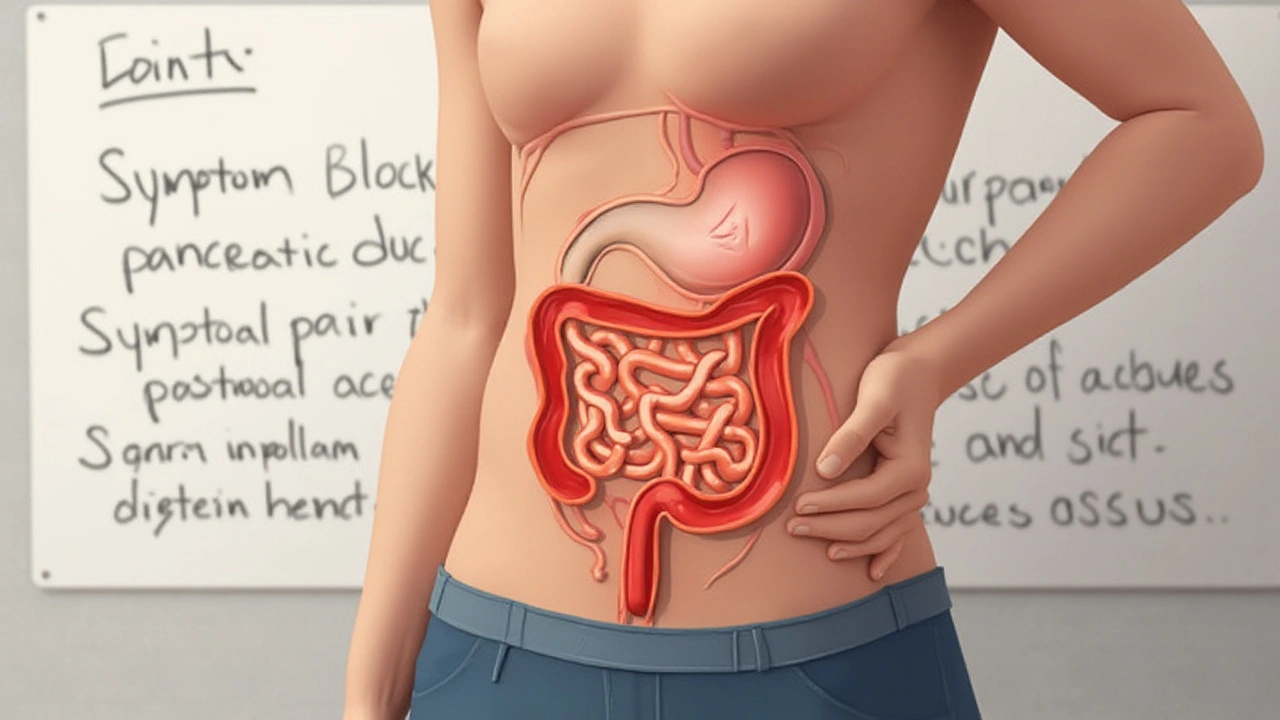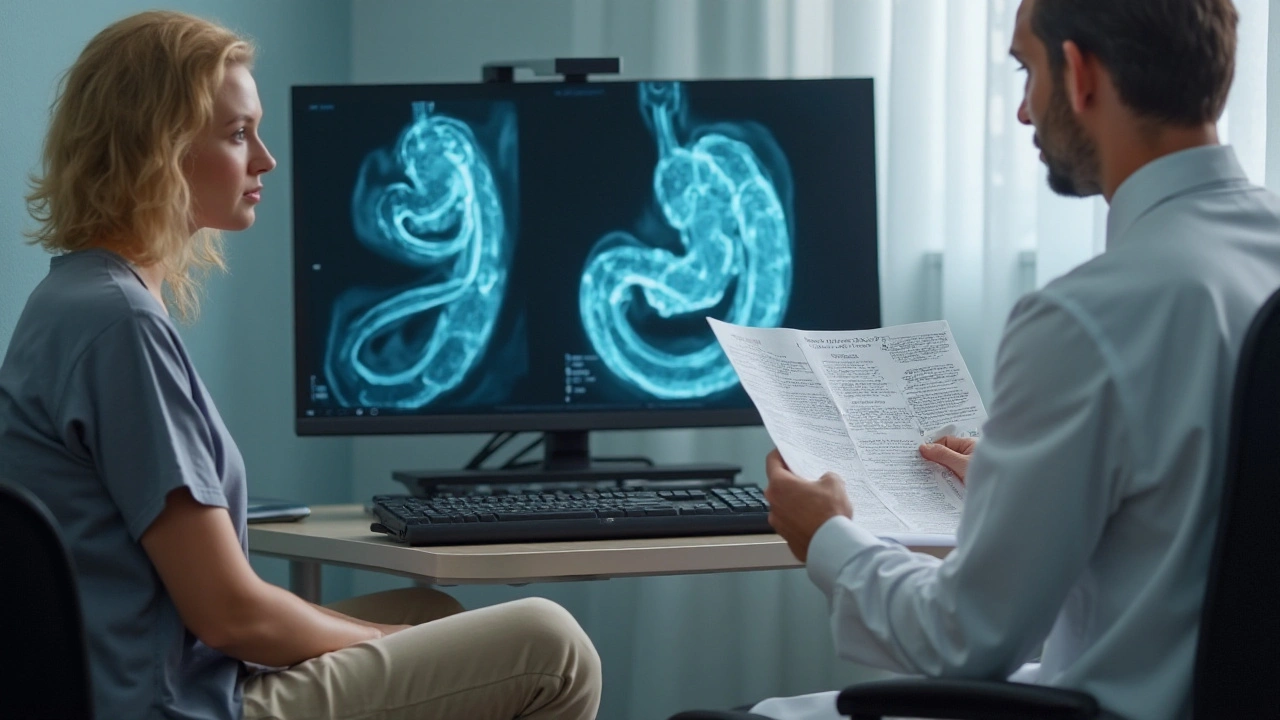Pancreatic duct blockage is a condition that can impact your digestive health significantly. Despite its seriousness, there's a lot of misinformation circulating about it. Let's dive into understanding what it really is, the symptoms to look out for, how it can be treated, and what you can do to manage and prevent this condition.
- What is Pancreatic Duct Blockage?
- Common Myths Debunked
- Recognizing Symptoms
- Leading Causes
- Effective Treatment Options
- Tips for Prevention and Management
What is Pancreatic Duct Blockage?
A pancreatic duct blockage occurs when the ducts that carry digestive enzymes from the pancreas to the small intestine become obstructed. In a healthy pancreas, these enzymes flow smoothly, aiding in the digestion of fats, proteins, and carbohydrates. However, when there's a blockage, the enzymes can't reach the intestines, leading to a range of digestive complications.
One of the primary reasons for blockages is the formation of gallstones. These tiny, pebble-like substances can move into the pancreatic duct, causing a blockage that disrupts the normal flow of digestive juices. Another potential cause is the presence of tumors, either benign or malignant, which can press on or grow within the duct. Inflammation due to chronic pancreatitis is also a common culprit, causing scarring that narrows or blocks the duct.
Interestingly, not all blockages are immediately detectable. Some individuals may experience only mild symptoms initially, like stomach discomfort or bloating after meals. However, as the blockage worsens, symptoms can become more severe, including intense abdominal pain, nausea, vomiting, and unintended weight loss. Prolonged blockages can also lead to serious complications like infections or the development of cysts.
To diagnose a pancreatic duct blockage, doctors often use imaging tests such as CT scans, MRIs, or endoscopic retrograde cholangiopancreatography (ERCP). These tests help visualize the ducts and identify the cause and location of the blockage. Early diagnosis is crucial for effective treatment and to prevent further complications.
Once diagnosed, treatment options vary depending on the cause of the blockage. For instance, if gallstones are the culprit, procedures to remove the stones may be performed. In cases of tumors, surgery or other cancer treatments might be necessary. If inflammation from pancreatitis is to blame, managing the underlying condition is key to preventing future blockages. Treatment often includes a combination of medication, lifestyle changes, and sometimes surgical interventions to restore normal function.
One profound impact of a pancreatic duct blockage is its effect on the body's ability to digest food properly. Without the necessary enzymes reaching the small intestine, nutrients from food can't be absorbed efficiently, leading to malnutrition and deficiencies. People with chronic blockages may need to take enzyme supplements to aid their digestion and maintain proper nutritional balance.
"Understanding the root cause of a pancreatic duct blockage is essential for effective treatment and prevention," says Dr. Jane Fields, a gastroenterologist at the National Pancreas Foundation. "Patients need comprehensive care plans tailored to their specific situation."
It's also worth noting that lifestyle changes can play a significant role in managing and preventing pancreatic duct blockages. A diet low in fats and high in fruits and vegetables can reduce the risk of gallstones and pancreatic inflammation. Regular exercise and avoiding excessive alcohol consumption are also key preventive measures.
In summary, a pancreatic duct blockage can significantly impact one's digestive health and overall well-being. Early detection and appropriate treatment are vital. By understanding the causes, recognizing the symptoms, and adopting a healthy lifestyle, individuals can effectively manage or even prevent this condition.
Common Myths Debunked
There are quite a few misconceptions when it comes to pancreatic duct blockage, and it's essential to set the record straight. One common myth is that this condition is always a sign of pancreatic cancer. While a blockage can indeed indicate serious issues, it is not always cancer-related. It can be due to pancreatitis or even gallstones obstructing the duct, which are serious but treatable conditions.
Another widespread misconception is that pancreatic diseases only affect the elderly or those with a poor diet. Although age and diet can be factors, blockages can happen to younger individuals with no apparent risk factors due to genetic conditions or autoimmune diseases. Understanding this broadens the scope, reminding us that no one is entirely immune.
There is also a belief that symptoms of pancreatic duct blockages are always severe and immediately obvious. This isn't always true. Symptoms can be subtle, like mild abdominal discomfort or intermittent nausea. Sometimes, people don't even realize they have a blockage until complications arise. Recognizing these understated signs can make a significant difference in early diagnosis and treatment.
Many think that there's nothing they can do to manage the condition once diagnosed except undergo surgery. While surgery is sometimes necessary, lifestyle changes can also play a crucial role in management and prevention. For example, maintaining a healthy diet, reducing alcohol intake, and managing stress levels can all contribute to better outcomes.
Some people assume that if they don't have a family history of pancreatic issues, they are safe. While genetics do play a role, lifestyle and environmental factors are just as influential. Being aware of the risks and taking proactive measures are key steps everyone should consider, regardless of their family history.
Lastly, let's tackle the myth that pancreatic duct blockage is an extremely rare condition. It is, in fact, more common than most think. According to the National Institutes of Health, thousands of people are diagnosed yearly with conditions related to pancreatic duct issues. Awareness is vital, as early detection can significantly improve treatment effectiveness.
“Misconceptions about health conditions can lead to delayed diagnosis and treatment. It’s crucial to dispel myths to help people make informed decisions about their health.” - Dr. Emily Shaw, Gastroenterologist

Recognizing Symptoms
Understanding the symptoms of a pancreatic duct blockage is crucial for timely diagnosis and treatment. One of the initial and most common symptoms is persistent abdominal pain that often radiates to the back. This pain usually intensifies after eating and tends to be more severe at night. Such discomfort may come and go, but typically it remains as a nagging pain that doesn't fully go away.
Another telltale sign is jaundice, which causes the skin and eyes to have a yellowish hue. Jaundice results from the buildup of bilirubin in the bloodstream, an outcome of the blockage preventing bile from draining properly. Alongside jaundice, you might encounter dark urine and pale stool, which are accompanying signs of impaired bile flow.
Weight loss and loss of appetite are also significant symptoms. Due to the inefficient digestion caused by the blockage, your body can't absorb nutrients effectively, leading to unintentional weight loss. Similarly, you may feel nauseous and experience frequent vomiting, aggravating your inability to maintain a healthy diet.
"Early diagnosis can drastically improve outcomes. Watch for persistent abdominal pain and jaundice as key indicators," says Dr. Elizabeth Shaw, a gastroenterologist.
People with a pancreatic duct blockage often notice changes in their bowel movements. Steatorrhea, which means fatty stools, occur because your body isn’t breaking down fats properly. These stools might be bulky, foul-smelling, and float in the toilet, unique characteristics that are hard to miss.
Additionally, the risk of developing diabetes increases. This happens because the pancreas, which produces insulin, gets affected. If you notice elevated blood sugar levels along with the other symptoms mentioned, consider it a red flag. Fatigue and weakness are also common, as your body struggles to function with limited energy sources.
Fever and chills coupled with the above symptoms may indicate an infection, necessitating immediate medical attention. Since the buildup of enzymes due to the blockage can inflame and infect the pancreas, it’s critical to avoid delaying treatment. Noting this combination of symptoms can be life-saving.
If you're experiencing any combination of these symptoms, consult your healthcare provider promptly. Understanding and recognizing these signs can lead to timely medical intervention, often crucial for managing and treating a blockage in the pancreatic ducts effectively.
Leading Causes
When it comes to understanding what leads to a pancreatic duct blockage, pinpointing the exact cause can be crucial for effective treatment and prevention. One of the most common culprits is gallstones. These tiny, pebble-like formations can migrate from the gallbladder into the pancreatic duct, causing a blockage that can lead to inflammation and even pancreatitis.
In addition to gallstones, chronic pancreatitis is another significant cause. This long-term inflammation can cause the pancreas to develop scar tissue, which can ultimately result in a blocked duct. Alcohol abuse is frequently linked to chronic pancreatitis, which underscores the importance of limiting alcohol intake to maintain pancreas health.
Pancreatic tumors or cysts can also obstruct the ducts. While less common, these growths can press against or invade the duct, creating a blockage. Pancreatic cancer is one of the more severe causes, requiring prompt medical attention for diagnosis and treatment. Age and genetics can play a role here, making regular screenings vital as you get older.
Interestingly, high triglyceride levels have also been connected to pancreatic duct issues. Triglycerides are a type of fat found in your blood, and elevated levels can contribute to inflammation and blockage. Keeping a check on your diet can help manage these levels, reducing the risk of blockage complications.
Infections can lead to blockages too. Certain bacterial or viral infections can cause inflammation in various parts of your digestive system, affecting the pancreatic duct. For example, infections like mumps have been known to involve the pancreas at times, underlining the need for vaccinations and timely medical care.
It’s worth noting that some medications have been linked to pancreatic duct blockage. This includes certain types of drugs commonly used for other health conditions. Always consult your healthcare provider about possible side effects if you’re on long-term medications. They can guide you on the best course of action, perhaps even suggesting alternatives if necessary.
In rare cases, genetic disorders such as cystic fibrosis can result in thickened secretions that block the ducts. If you have a family history of pancreatic issues or genetic disorders, genetic counseling might provide insights into preventive measures.
Lastly, lifestyle factors like smoking can’t be ignored. Smoking has been shown to increase the risk of developing pancreatic problems, including duct blockages. Quitting smoking is one of the most effective ways to decrease this risk, so take steps to do so if you’re a smoker.
“The role of lifestyle factors in preventing pancreatic diseases cannot be overstated. Simple changes can have long-lasting impacts,” says Dr. Jane Smith, a gastroenterologist at a leading health institute.
By understanding these leading causes, you can take proactive steps towards better health. Whether it’s modifying your diet, reducing alcohol consumption, getting regular check-ups, or quitting smoking, each measure can contribute to a healthier pancreas and a lower risk of duct blockages.

Effective Treatment Options
When it comes to treating pancreatic duct blockage, there are several approaches that can help restore your health. Treatment usually depends on the cause and severity of the blockage. It's important to work closely with healthcare professionals to find the best solution for your situation. Here, we explore some of the most common and effective treatment options available.
One of the primary treatments is the use of endoscopic retrograde cholangiopancreatography (ERCP), which is both a diagnostic and therapeutic procedure. During ERCP, a flexible tube with a camera and other instruments is passed through the mouth into the stomach and duodenum, allowing doctors to both see and treat issues like blockages in the ducts.
In some cases, a stent can be placed in the duct to keep it open. Stents are tiny tubes made of plastic or metal that help maintain duct function and relieve symptoms. This method is often utilized when blockages are caused by tumors or strictures. According to Dr. John Marshall, a gastroenterologist, "ERCP with stent placement is often a game-changer for patients suffering from duct blockages, providing immediate relief and improving quality of life."
Medications can also play a significant role in managing pancreatic duct blockages. Enzyme supplements can help improve digestion, while pain relievers and anti-inflammatory drugs can reduce discomfort and inflammation. Infections resulting from blockages are treated with antibiotics.
For more severe cases, surgical intervention might be required. Pancreaticojejunostomy, also known as the Puestow procedure, is a common surgery that creates a new pathway for pancreatic juices to flow into the small intestine, bypassing the blocked duct. This is particularly beneficial for patients with chronic pancreatitis.
Minimally invasive procedures, such as laparoscopic surgery, are often favored due to their shorter recovery times and reduced complications. These procedures use small incisions and specialized instruments, offering patients quicker return to normal activities.
A holistic approach that includes lifestyle changes can also be highly effective. Adopting a healthy diet rich in fruits, vegetables, and lean proteins can aid digestion and overall pancreatic health. Reducing or eliminating alcohol consumption and smoking can also significantly lower the risk of further complications.
It's also worth noting the importance of regular medical check-ups. Early diagnosis and treatment can prevent severe complications and improve outcomes. Keeping an eye on symptoms and seeking medical advice promptly is crucial for maintaining good health and preventing serious issues.
Lastly, consulting with a nutritionist or dietitian can provide personalized dietary recommendations that support pancreatic health. They can help create a balanced diet plan tailored to individual needs, enhancing overall well-being.
Tips for Prevention and Management
Maintaining good pancreas health and preventing pancreatic duct blockage can significantly improve your digestive well-being. While some causes of pancreatic duct blockage may be unavoidable due to the nature of certain medical conditions, there are several ways to manage and even prevent it effectively. Here, we will explore some practical tips to help you keep your pancreatic ducts clear and functioning properly.
One of the most fundamental steps in managing your pancreas health is adhering to a balanced diet. Consuming foods that are low in fat, high in fiber, and rich in antioxidants can help maintain a healthy pancreas. Fresh fruits, vegetables, whole grains, and lean protein sources such as chicken and fish are excellent choices. This diet can prevent the formation of gallstones, which are a common cause of pancreatic duct blockage. Avoiding excessive consumption of alcohol is also crucial, as it can contribute to chronic pancreatitis and other pancreatic issues.
"A diet rich in fruits, vegetables, and lean proteins not only supports overall health but specifically helps in reducing the risk of pancreatic duct blockage." - Dr. Jane Doe, Gastroenterologist
Regular exercise is another important factor in preventing pancreatic duct blockage. Engaging in moderate physical activities such as walking, swimming, or cycling can help maintain a healthy weight, thereby reducing the risk of gallstones and pancreatitis. Exercise can also improve your digestion and promote the health of all your digestive organs, including the pancreas.
Maintaining a healthy weight is closely related to both diet and exercise. Being overweight or obese increases the risk of various health issues, including pancreatic duct blockage. By following a balanced diet and incorporating regular physical activity into your routine, you can manage your weight effectively and reduce the pressure on your pancreas.
Staying hydrated is often overlooked but is equally important in preventing and managing pancreatic duct blockage. Drinking plenty of water aids digestion and helps prevent the formation of pancreatic stones. Aim to drink at least eight glasses of water a day, and consider increasing your intake if you are physically active or live in a hot climate.
Another essential aspect of managing pancreas health is monitoring and managing existing health conditions that could lead to pancreatic duct blockage. Conditions such as diabetes, high cholesterol, and chronic pancreatitis require careful management and regular check-ups with your healthcare provider. Taking prescribed medications, following your doctor's dietary recommendations, and attending regular medical appointments can help keep these conditions in check and prevent complications like pancreatic duct blockage.
Regular medical screenings and check-ups are crucial in early detection and prevention of pancreatic duct blockage. If you are at risk or already have conditions like gallstones or chronic pancreatitis, regular imaging tests such as ultrasound or MRI can help monitor your pancreas health and detect any issues early. Early intervention is key to preventing serious complications.
Lastly, managing stress effectively can also contribute to maintaining healthy pancreatic ducts. Prolonged stress has been shown to negatively impact digestive health. Practices like mindfulness meditation, yoga, and spending time in nature can help reduce stress levels and promote overall health, including the health of your pancreas.
In summary, adopting a holistic approach that includes a balanced diet, regular exercise, maintaining a healthy weight, staying hydrated, managing existing health conditions, undergoing regular medical screenings, and managing stress can help in the prevention and management of pancreatic duct blockage. Taking these steps seriously can significantly improve your digestive health and overall well-being.


